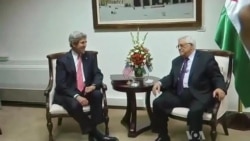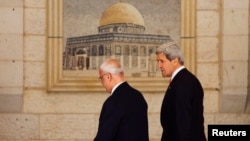JERUSALEM/RAMALLAH —
U.S. Secretary of State John Kerry met separately Thursday with Israeli Prime Minister Benjamin Netanyahu and with Palestinian Authority President Mahmoud Abbas as part of Obama administration efforts to jump-start peace talks.
Netanyahu commended U.S. Congressional moves to upgrade sanctions against Tehran and recommit the United States to standing with Israel against the threat of Iran's nuclear program.
"But above all," he said, "what we want to do is to restart the peace talks with the Palestinians."
Ahead of their Jerusalem meeting, Kerry said he is grateful for the seriousness with which Netanyahu is working on returning to those talks and appreciative of the personal energy he is putting into helping move forward.
"I know this region well enough to know that there is skepticism, in some quarters there is cynicism and there are reasons for it," Kerry said. "There have been bitter years of disappointment. It is our hope that by being methodical, careful, patient, but detailed and tenacious, that we can lay out a path ahead that can conceivably surprise people but certainly exhaust the possibilities of peace."
Kerry met separately with Palestinian President Abbas in the West Bank, but neither man spoke with reporters ahead of those talks.
Chief Palestinian negotiator Saeb Erekat told a United Nations committee this week that Palestinians are "exerting every possible effort" to see that U.S. peace efforts succeed. He added: "No one benefits more from the success of Secretary Kerry than Palestinians and no one loses more from his failure than Palestinians."
Erekat said "there is a good opportunity now" to get to a two-state solution to the conflict roughly along pre-1967 boundaries.
Kerry has helped revive an Arab League peace initiative on a two-state solution that includes concessions of land swaps to account for post-1967 Israeli settlements.
Kerry and Netanyahu also discussed the civil war in neighboring Syria and a U.S./Russia initiative to negotiate a transitional authority for Damascus.
"Nobody has any illusions about how difficult, complicated, what a steep climb that is," Kerry said. "But we also understand that the killing that is taking place, the massacres that are taking place, the incredible destabilization of Syria is spilling over into Lebanon, into Jordan, and has an impact obviously on Israel."
Israel is thought to have attacked weapons shipments inside Syria that were going to Lebanese Hezbollah militants who have increasingly joined the fight alongside troops loyal to embattled Syrian President Bashar al-Assad.
While Russia is a co-sponsor of this Syrian peace effort, it remains one of the biggest arms suppliers to the government in Damascus.
"S-300 missiles coming from Russia, or other countries, Iran missiles, are destabilizing to the region," Kerry said. "The United States is committed, not only in its defense of Israel, but in its concerns for the region to try to address this issue."
Netanyahu also met Thursday with former French President Nicolas Sarkozy and with British Foreign Secretary William Hague. Hague was in Jordan Wednesday with Kerry and officials from nine other countries backing Syria's opposition.
That group agreed to increase its support for opposition groups if Assad does not agree to peace talks.
Netanyahu commended U.S. Congressional moves to upgrade sanctions against Tehran and recommit the United States to standing with Israel against the threat of Iran's nuclear program.
"But above all," he said, "what we want to do is to restart the peace talks with the Palestinians."
Ahead of their Jerusalem meeting, Kerry said he is grateful for the seriousness with which Netanyahu is working on returning to those talks and appreciative of the personal energy he is putting into helping move forward.
"I know this region well enough to know that there is skepticism, in some quarters there is cynicism and there are reasons for it," Kerry said. "There have been bitter years of disappointment. It is our hope that by being methodical, careful, patient, but detailed and tenacious, that we can lay out a path ahead that can conceivably surprise people but certainly exhaust the possibilities of peace."
Kerry met separately with Palestinian President Abbas in the West Bank, but neither man spoke with reporters ahead of those talks.
Chief Palestinian negotiator Saeb Erekat told a United Nations committee this week that Palestinians are "exerting every possible effort" to see that U.S. peace efforts succeed. He added: "No one benefits more from the success of Secretary Kerry than Palestinians and no one loses more from his failure than Palestinians."
Erekat said "there is a good opportunity now" to get to a two-state solution to the conflict roughly along pre-1967 boundaries.
Kerry has helped revive an Arab League peace initiative on a two-state solution that includes concessions of land swaps to account for post-1967 Israeli settlements.
Kerry and Netanyahu also discussed the civil war in neighboring Syria and a U.S./Russia initiative to negotiate a transitional authority for Damascus.
"Nobody has any illusions about how difficult, complicated, what a steep climb that is," Kerry said. "But we also understand that the killing that is taking place, the massacres that are taking place, the incredible destabilization of Syria is spilling over into Lebanon, into Jordan, and has an impact obviously on Israel."
Israel is thought to have attacked weapons shipments inside Syria that were going to Lebanese Hezbollah militants who have increasingly joined the fight alongside troops loyal to embattled Syrian President Bashar al-Assad.
While Russia is a co-sponsor of this Syrian peace effort, it remains one of the biggest arms suppliers to the government in Damascus.
"S-300 missiles coming from Russia, or other countries, Iran missiles, are destabilizing to the region," Kerry said. "The United States is committed, not only in its defense of Israel, but in its concerns for the region to try to address this issue."
Netanyahu also met Thursday with former French President Nicolas Sarkozy and with British Foreign Secretary William Hague. Hague was in Jordan Wednesday with Kerry and officials from nine other countries backing Syria's opposition.
That group agreed to increase its support for opposition groups if Assad does not agree to peace talks.











